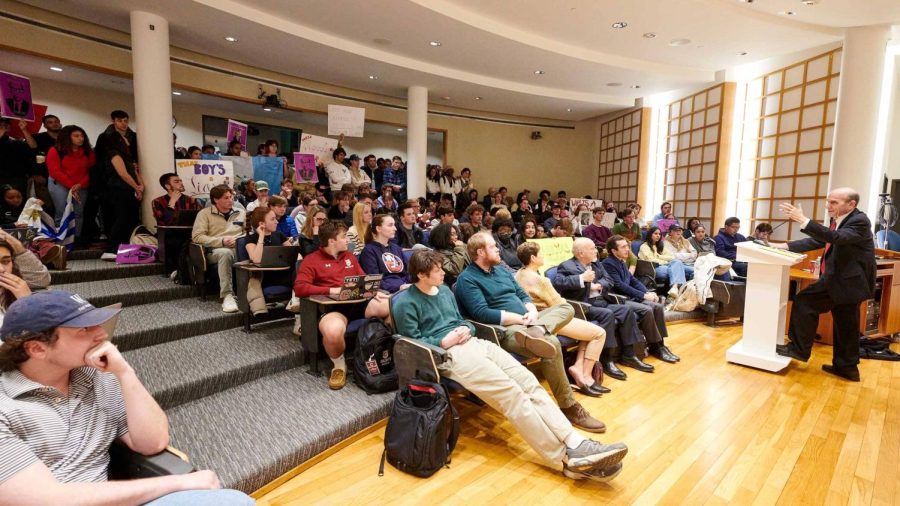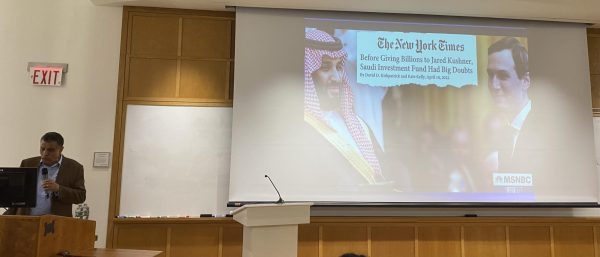Elliott Abrams Lecture Prompts Student Protest, Discussion
In a lecture funded by the Political Science Department’s Kulla Fund and the Lampert Institute for Civic and Global Affairs, Elliott Abrams — a senior fellow for Middle Eastern studies at the Council on Foreign Relations (CFR) who previously served under presidents Ronald Reagan, George W. Bush and Donald Trump — spoke to the Colgate community about the current state of the Middle East on Tuesday, Mar. 28. However, many students expressed disappointment and anger at the decision to bring Abrams, who has a controversial past, to campus.
The event, titled “The Middle East in 2023: Challenges and Opportunities,” was held in the Persson Hall auditorium. The auditorium was packed with students and Colgate community members, filling the room to its capacity. Some students protesting the event held posters and signs calling Abrams a “liar” and alluding to his involvement in controversial foreign policy events.
Those who protested the event cited his 1991 conviction of withholding information from Congress about the Iran-Contra affair – a charge from which he was later pardoned by President George H.W. Bush — as well as his support for the Iraq war and alleged involvement in human rights conflicts in Venezuela and El Salvador.
First-year Reem Numan helped organize the protest.
“Before this talk, I didn’t know who Elliott Abrams was, but I was very, very familiar with the Iran-Contra affair,” Numan said. “I researched what his position was in [the affair] and what he and the Reagan administration [did], and I was disgusted. Once I saw that people were starting to protest, I jumped full in. I helped make posters, I helped make picket signs, and I helped organize the GroupMe.”
According to Associate Professor of Political Science Bruce Rutherford, the Political Science Department chose to bring Abrams as a speaker in order to facilitate engagement with varying ideas about the region, specifically in connection with Rutherford’s Middle East Politics course, POSC 215.
“Each semester that I offer this course, I make a point of bringing at least one speaker who will expose students to a point of view significantly different from mine,” Rutherford explained. “This experience helps students appreciate the range of perspectives on this complicated region. With regard to Mr. Abrams, he holds views regarding the US invasion of Iraq that diverge substantially from mine.”
Rutherford opened the discussion by asking attendees to engage with Abrams through direct questions, not just statements, and he urged the packed room to remain respectful throughout the event.
Sophomore Sarafina Lewis also participated in the protest, and she described the goals and planning process, which included creating a list of demands for the University.
“A group of students got together, wrote a statement of demands to the administration, and then created a group chat for people who allied with the cause […] there was no one person in charge, it was a collective of people who were against Elliott Abrams’ politics and actions,” Lewis explained. “By taking the time to look at [Abrams’] history, we see the unsound ethics of bringing Elliott Abrams [to campus].”
Numan expanded on what she felt was the importance of student engagement in affecting change, especially when students disagree with a decision made by the University. Numan alleges that by bringing controversial speakers such as Abrams, the University does not uphold its commitments to diversity, equity and inclusion.
“I’m disappointed. I’m angry. And I’m sad that this institution is still not upholding its values,” Numan said. “And so, the goals of the protest were to spread awareness and embarrass [Abrams].”
Junior Mia Stagner, who attended the event but was not directly involved in the protest, commented on her takeaways from the lecture and the student response.
“I was proud of the Colgate community and their coordinated response to his arrival. [Abrams] is obviously a very controversial speaker, rightfully so,” Stagner explained. “The questions [students] asked were very well articulated and I was very interested in hearing my peers’ opinions on the discussion […] What I did notice was [Abrams’] aversion to a high percentage of more oppositional questions.”
Stagner expressed pride for her peers in engaging with a difficult situation in what she described as an impactful, yet respectful, way.
“Overall, I was more impressed by Colgate students than I was with Abrams himself,” Stagner concluded.
Abrams spoke on contemporary issues in the countries of Tunisia, Egypt, Israel and Iran, explaining why these regions are important to U.S. foreign policy today. Abrams also asserted that the U.S. must engage more directly with international human rights issues and criticized the idea that the U.S. has been pulling out of Middle Eastern affairs.
After speaking for about an hour, members of the Colgate community had the opportunity to ask Abrams questions. While most of these questions were involving the content of his lecture, some students asked more probing questions, often eliciting applause from the audience.
As he left the stage, protesters chanted “Elliot Abrams, you can’t hide! We charge you with genocide,” alluding to Abrams’ alleged involvement in humanitarian crises in Latin American countries and alleged downplaying of genocide in El Salvador.
The University issued a statement by Senior Director of Communications and Media Relations Daniel DeVries on Monday, Apr. 3, regarding the event. The statement highlighted the University’s commitment to open debate and described the respectful nature of the protest: “Students at Colgate intentionally designed their engagement with the speaker to ensure the kind of dialogue that allowed the community to ask challenging and well-informed questions. Abrams was never interrupted during his talk.”
The Student Government Association (SGA) also sent an email to the student body on Tuesday, Mar. 28 acknowledging the event and the student response.
“We are aware of the ongoing impact of a lecture and discussion event by the Political Science Department, ‘The Middle East in 2023: Challenges and Opportunities’ on some members of the Student Body,” the email read. “We want to take a moment to remind every member of our community of your rights to freedom of speech, freedom of expression, and peaceful assembly.”
SGA also attached the University’s guidelines for demonstration in the email, which were created in 2020.

Annabel Morris is a senior from Rumson, NJ concentrating in political science and minoring in Middle East & Islamic studies and anthropology. She has...




